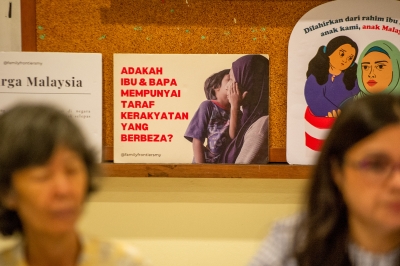KUALA LUMPUR, Oct 24 — The Malaysian government’s Bill to change citizenship laws takes “one step forward, one step back” as it recognises Malaysian women’s equal rights to pass on citizenship automatically to their overseas-born children, but also has amendments that may increase the number of stateless persons, four international groups said today.
The Bill had already passed the first stage of the law-making process last Tuesday (October 17), when it received supermajority support in the Dewan Rakyat with 206 MPs voting in favour and just one MP voting against it.
This proposed new law, Constitution (Amendment) Bill 2024, will next have to be voted on in the Dewan Negara, and receive the Yang di-Pertuan Agong’s royal assent and be gazetted to become law.
The four international groups today urged lawmakers at the Dewan Negara to be aware of the potential harm in the proposed new law (including to the indigenous Orang Asli and Orang Asal communities and those who moved to Malaysia before Merdeka in 1957 and still only have permanent resident status in Malaysia), and said the lawmakers should ask the Malaysian government to mitigate any risks.
Here’s a summary of the five things that the international groups said the Dewan Negara should call on the Malaysian government to do:
1. Process all existing applications for Malaysian citizenship within the next year, in line with the home minister’s commitment in the Dewan Rakyat and according to the laws applicable at the time.
2. Implement the new standard operating procedures (SOPs) (announced by the home minister) for citizenship applications under the Federal Constitution’s Article 15A (citizenship by registration) and Article 19(1) (citizenship by naturalisation).
(The international groups said this will address concerns about inefficient, complex, discriminatory bureaucratic practices; lack of transparency in citizenship applications; and the reduced age limit to apply for citizenship from age 21 to age 18.)
3. Resolve the status of stateless individuals who have permanent resident status. And establish effective and timely safeguards; and clear pathways to citizenship to prevent stateless PR holders’ children from also becoming stateless.
4. For Malaysian women’s children who were born overseas before the new law takes effect: To resolve their citizenship status and establish clear, effective, timely pathways to citizenship for them. (Especially for those who do not have existing citizenship applications, and those who are above age 18 and can no longer apply for citizenship by registration under the new age limit.)
5. Ensure all children (including stateless children or children at risk of statelessness) are granted citizenship without discrimination, arbitrariness, or delay.
The Dewan Negara will next meet from December 2 to December 19, where lawmakers will debate and vote on the Budget 2025 and government Bills — which can include this Bill on the amendments to citizenship laws in the Federal Constitution.
The statement was jointly issued by four international groups advocating for the rights of stateless people: The Global Movement Against Statelessness; Institute on Statelessness and Inclusion; Nationality For All; and Statelessness and Dignified Citizenship Coalition – Asia Pacific.

